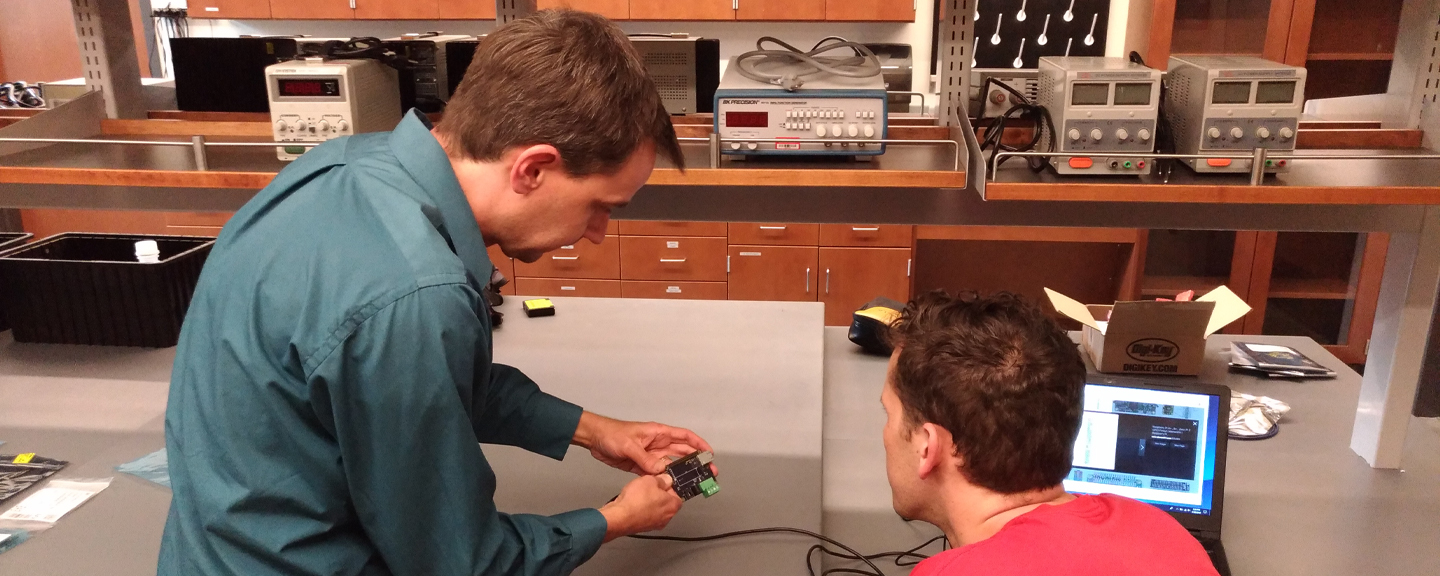- Home
- >
- APU Articles
- >
- News Article
APU Graduates First Cohort of Engineering Students
June 05, 2019 | Written By Nathan Foster

When Samuel Vander Dussen walked across Azusa Pacific University’s commencement stage to receive his diploma on May 4, he was one of seven students to graduate in APU’s first engineering cohort. Vander Dussen landed a job before graduating, joining two other classmates at Raytheon, a major U.S. defense contractor. “My engineering professors prepared me for my job by teaching me how to learn on my own. They gave me the tools to find solutions to problems and to succeed,” he said.
“Our students getting jobs at Raytheon and other prominent companies right out of college speaks very highly of our program,” said George Thomas, Ph.D., chair and professor in the Department of Engineering and Computer Science (ECS). “As word gets out about the caliber of our curriculum and the professional credentials of our faculty, interest in the program grows.” Thomas said in a few years the engineering program would likely increase in size to match its computer science counterpart.
Students can earn a bachelor’s degree in engineering with a concentration in either systems or computer engineering. The program will add more concentrations in the near future. “Many students have asked for mechatronics, a marriage between mechanical and electrical/computer engineering. Engineering as a field has changed a lot recently. You can no longer stick in one corner. Students need to be strong in one area, but well rounded in other fields as well.” Currently, APU's engineering program is pursuing accreditation through the Accreditation Board of Engineering and Technology (ABET) and establishing industry partners to serve in an advisory capacity.
James Yeh, Ph.D., assistant professor, has been instrumental in helping grow the engineering program and instructing students at a high level. Yeh taught a senior-level design class for students in the first cohort. In this class, the students worked with Mission Aviation Fellowship, an organization that distributes medical supplies and shares the Gospel with remote regions across the globe. “We worked on two projects, including one where we helped design a power monitoring system for an isolated airstrip in the jungles of Indonesia,” Yeh said. “God really blessed that project and the students did very well on it. It shows how we can use our engineering knowledge to love and help our neighbors as Jesus commanded us to.”
In addition to this project, students have the opportunity to perform research during their summers. Assistant professor Rick Sturdivant, Ph.D., said this is key to students landing internships and top notch jobs when they graduate. “Our students have had the opportunity to perform research on solar powered phone charging stations, drone detection radar systems, pico hydro electric power for a village in the Nepalese Himalayas, satellite communications, and Internet of Things devices,” he said. “Their work has been published and presented at international conferences. This level of research sets our graduates apart and demonstrates their technical skills with real world applications.”
Sturdivant said internships are a huge component in students getting jobs so quickly after graduation. “We help schedule our students to participate in job fairs at prospective employers such as Raytheon. This is a chance for students to meet face to face with employers who are seeking engineering graduates with their skills,” he said. “We also organize visits to employers such as Northrop Grumman and the Jet Propulsion Labs (JPL). This give students the chance to network with employers and to see the work they perform first hand.”
Yeh said many students choose engineering because the job market is good. The Bureau of Labor Statistics (BLS) projects heavy employment growth for the field, with nearly 140,000 new jobs expected for engineers over the next decade. In 2016, engineers had a median annual wage of $91,010—more than twice the median wage for all workers. The strong job market has led to vast growth among engineering departments at universities across the country. Unfortunately, many engineering programs are impacted by this growth, especially at state schools, where students often can’t get the classes they need, leading to delayed graduation. “A major benefit of APU’s engineering major is small class sizes,” Yeh said. “Our students are working closely with faculty and one another, doing projects that focus on the kingdom, graduating on time, and getting excellent jobs.”
Request Information About: Engineering Major